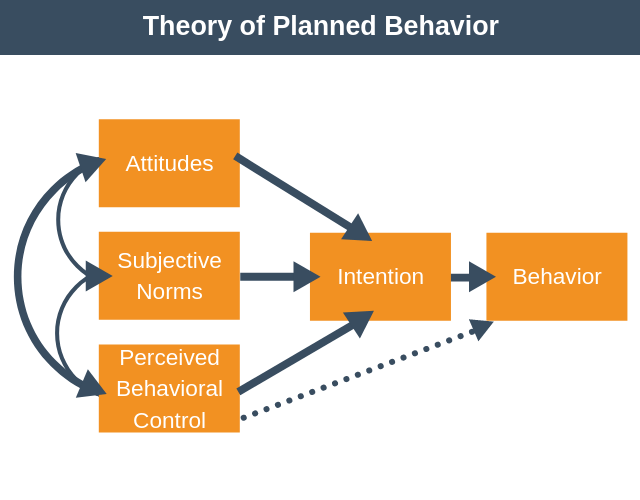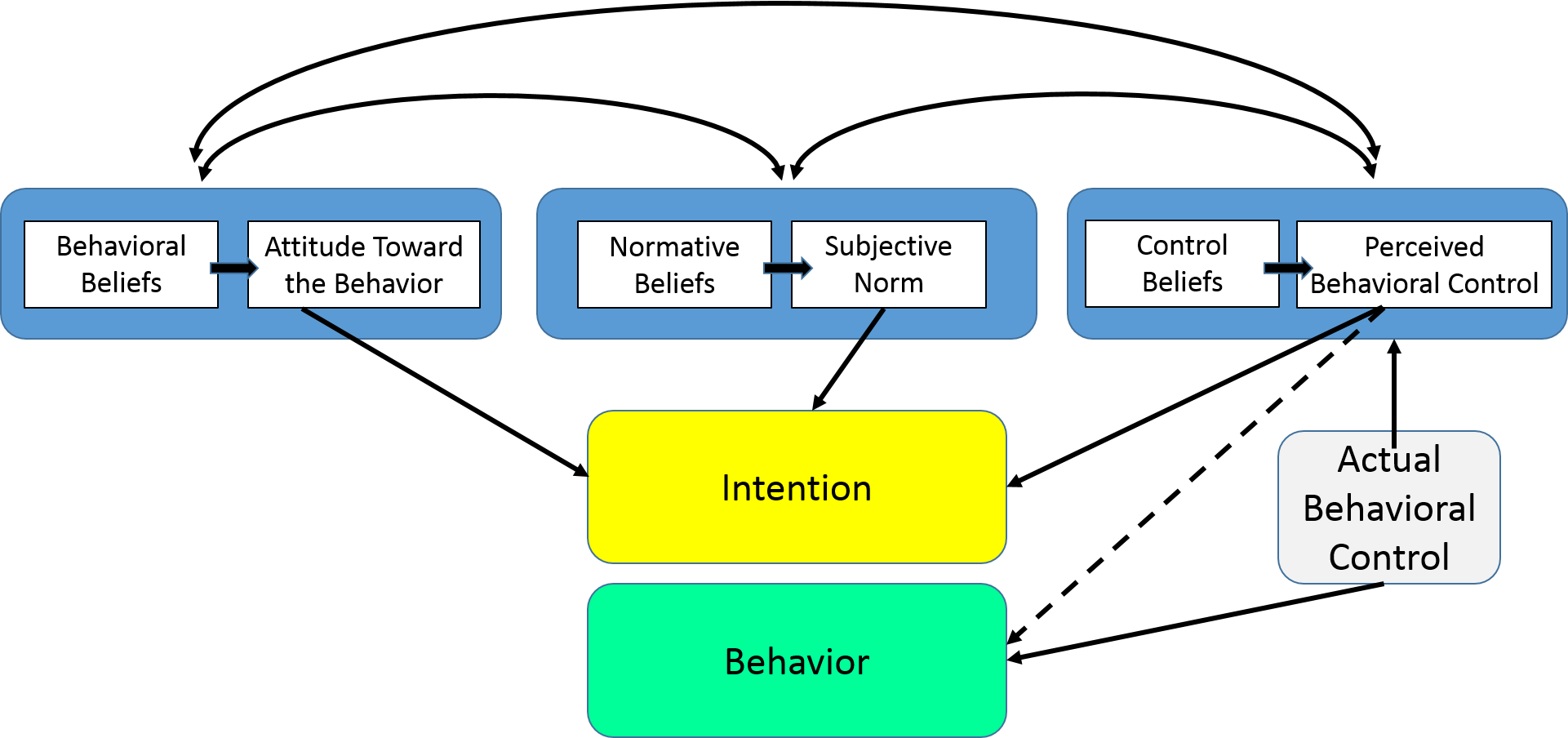This kind of believes is connected with personal goals and a degree to which specific behaviour assists with reaching those aims. As a result social media marketing is becoming increasingly popular Duffett 2015.

Theory Of Planned Behaviour Ajzen 1991 Download Scientific Diagram
Theory of Planned Behavior and Guerrilla Marketing.

. 101186s12966-015-0324-z PMC free article Google Scholar McEachan RRC Conner M Taylor NJ Lawton RJ 2011. The theory of planned behavior links the beliefs of an individual to their behavior. The Theory of Planned Behavior TPB is seen as an improvement to the TRA often mentioned and discussed with it.
Attitudes peers and perceived behavioral control affect how consumers feel about a specific behavior. It is an idea that can be applied to any human interactions from marketing campaigns to healthcare to religion. In turn a tenet of TPB is that behavioral intention is the most proximal determinant of human social behavior.
Data generated through the questionnaire were analysed using descriptive. The key component to this model is behavioral intent. According to Vermeir and Verbeke 2008 theory of planned behavior is a well-supposed scaffold for determining pragmatically identifying and conceptualizing factors that verify behavior and intension of the.
The TPB maintains what TRA postulated about human behavior being governed by ones attitudes and behavioral intentions characterized by the presence of. Kabadayi Price 2014. This element describes an individuals feeling about the behaviour in question.
The application of basic marketing principles to the design and implementation of programmes and information campaigns that. The Theory of Planned Behavior TPB postulates that the likelihood of an individual engaging in a health behavior for example regular exercise is correlated with the strength of his or her intention to engage in the behavior. A behavioral intention represents an individuals commitment to act and is itself the outcome of a combination of.
A systematic review and meta-analysis. Literature review Facebook advertising In the past decade social media such as Facebook Twitter and LinkedIn have radically redefined the communication landscape for both individuals and brands. The Theory of Planned Behavior TPB is an established behavioral psychological theory that links beliefs and behavior.
Ajzen propounded the theory in 1985 to aid in establishing factors that leads to consumer purchase intentions. Attitude towards behavior ones own opinions about the behavior. International Journal of Behavioral Nutrition and Physical Activity 12 162.
The theory of planned behavior TPB is one of the famous theories used to predict a persons intentions in various contexts using the subjective normative component. As a result the Theory of planned behavior is essential to marketers when it comes to understanding where specific consumer behaviors are generated. The Theory of Planned Behaviour Advertising is used for brand promotion and for non-profit purposes such as social marketing.
The Theory of Planned Behavior The theory was intended to explain all behaviors over which people have the ability to exert self-control. The theory of planned behavior is a psychological theory that links beliefs to behavior. It was developed by Icek Ajzen in 1985 and since been applied to studies of the relations among beliefs attitudes behavioral intentions and behaviors in various aspects of business such as marketing public relations and.
It is an idea that was first proposed by Icek Ajzen allowing for the predictability of reasoned actions when behavioral controls are in place. The theory of planned behavior is an extension of the theory of reasoned action Ajzen. How is the Theory of Planned Behavior Used to Control Behavior.
The better the feeling an individual has about the required change the greater the likelihood of adopting this. The article develops understanding of the factors that influence the sustainable marketing SM behavior of marketing managers in an emerging-country context using the lens of the theory of planned behavior TPB. The Theory of Planned Behavior refers to the study of the relationships between behavioral attitudes subjective norms and perceived behavioral control and how they influence intentions and finally consumers behavior.
The theory maintains that three core components namely attitude subjective norms and perceived behavioral control together shape an individuals behavioral intentions. 1 The theory of planned behavior TPA incorporates several variables aiming to predict the likelihood of someone staying with the same behavior or making a behavioral change. Social media marketing is thus.
Behavioral intentions are influenced by the attitude about the likelihood that the behavior will have the expected outcome and the subjective evaluation of the risks and. This makes sense since the TPB reinforces and adds to the assumptions in the TRA. In combination the attitude toward the behavior subjective.
Theory of Planned Behavior Purchase Intentions. As such the researchers asked questions of. The theory of planned behaviour was adopted as a framework for the study.
Fishbein Ajzen 1975 According to the theory of planned behavior perceived behavioral control together with behavioral intention can be used directly to predict behavioral achievement. The theory of planned behavior and discrete food choices. Additionally this increases marketers abilities to predict.
This theory is based on a number of constructs which are illustrated in figure 1. This study aimed to uncover the internal and external factors driving Millennial consumers to engage in Online Video Advertisements OVAs sharing. The Theory of Planned Behavior 1991 First category is concerned with individuals perception of the level to which behaviour will influence a desired result.
Hoay Tan et al used the theory of planned behavior to develop consumer intentions for using new value-added pharmacy services VAS. Theory of Planned Behaviour Ajzen 1991 Attitude. Behavioral beliefs produce a favorable or unfavorable attitude toward the behavior normative beliefs result in perceived social pressure or subjective norm and control beliefs give rise to perceived behavioral control.
Data were collected from 145 senior marketing managers from a range of industrial sectors in Bangladesh. The theory of Planned Behavior includes six factors.

Theory Of Planned Behavior Explained With Example

The Theory Of Planned Behavior Simply Psychology
The Theory Of Planned Behaviour And User Engagement Applied To Facebook Advertising

Summary Of Theory Of Planned Behavior Abstract

Theory Of Planned Behaviour With Examples In Relation To Chlamydia Download Scientific Diagram

The Theory Of Planned Behavior
The Theory Of Planned Behaviour And User Engagement Applied To Facebook Advertising

3 The Theories Of Reasoned Action And Planned Behavior Download Scientific Diagram
0 comments
Post a Comment